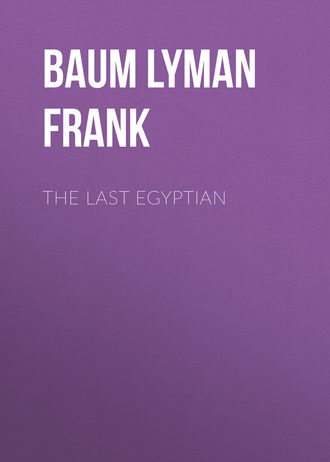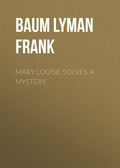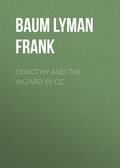
Лаймен Фрэнк Баум
The Last Egyptian
CHAPTER IV
THE TREASURE OF AHTKA-RĀ
Kāra went to the cavity beside the arch and took from it a small bronze lamp. It was partly filled with oil, on the surface of which a cotton wick floated. The lamp itself was of quaint design, and the young man remembered it since the days of his childhood, but had rarely seen it in use.
Having lighted the wick and spread it with his fingers until it flamed up brightly, Kāra turned his back to the arch and carefully examined the rear wall of the room. The house, as has been explained, was built against a shallow cave of the mountains; but, owing to the irregularity of the hollow, part of the rear wall was of solid masonry, while the other part was formed by the cliff itself. Kāra had never before paid much attention to that fact, but now it struck him as very evident that the masonry had been constructed to shut off an orifice too deep or too irregular to be utilized as part of the dwelling. Otherwise, the continuation of the cliff would have rendered a wall unnecessary. The stones were of large size and were built up and cemented as far as the overhanging rock that formed the greater portion of the roof.
The Egyptian’s eyes rested upon the third layer of these stones, and he counted from the corner to the seventh stone. In appearance this was not different from the others; but Hatatcha’s directions had been exact, and she knew.
He walked to the spot and pressed hard against the right edge of the stone. It moved, and gradually swung inward, the left edge being supported by solid pivots of bronze at the top and bottom.
The opening disclosed was about four feet long by three feet in height, and Kāra at once crept through it, holding his lamp extended before him. Yes; his surmise had been correct – a low, but deep and irregular cavern was behind the wall.
His first care was to close up the entrance by pressing the block of stone back to its former position. There was a bronze handle on the inner side that would permit him to open it again easily.
The cavern felt damp and cool, and when he raised his lamp he saw some deep fissures leading far under the mountain. He selected the second from the left of these rifts and cautiously made his way along the rough floor. At first it seemed that he had made a mistake, for this way was less promising than several of the others; but when he stopped and thought upon Hatatcha’s directions, he knew that he was right.
The rift made a sudden turn and sank downward; but the rocks under his feet were now more even and the way became easier to traverse. A hundred paces farther, the passage ended abruptly in a sharp point where the rock had originally split.
The young Egyptian walked to the extreme end and then carefully measured three paces back again. Raising his lamp, he examined the right wall of the tunnel closely. It contained many irregular cracks and hollows, but one indentation seemed, on observation, to be surrounded by a tiny circle of black, or a color darker than the other portions of the rock.
Kāra uttered an ejaculation of pleasure. He had feared he might not find this spot, in spite of his grandmother’s assurances that it was plain to keen eyes.
Drawing a short, pointed dagger from the folds of his burnous – a weapon he had found in the crypt beside the arch of the living-room – the Egyptian thrust it into the orifice of the rock and pushed until it had sunk in to the very hilt. Then he turned the handle, and a sharp “click” was audible.
Kāra stepped back a pace, and a part of the rock, circular in shape, swung slowly out into the passage, revealing another tunnel running at right angles with the first. Unlike the other, this was no natural fissure of the rock, but an excavation cleverly made by the hands of man. The roof was arched and the floor level and smooth.
The man slipped through the opening and proceeded along the arched passage. He did not close this door behind him, for Hatatcha had warned him not to do so. The floor had a gradual slope and he knew that he was going still farther beneath the mountain at every step. The atmosphere now became hot and stifling and he found it difficult to breathe; but he continued steadily walking for a matter of five minutes – which seemed an hour – holding the lamp before him, until finally he noticed the blaze of the wick flicker, as if a breath of fresher air had reached it.
By this time his breast had seemed ready to burst, and his breathing was fitful and gasping; but he hurried forward and now found the air cooler and fresher and drew it into his lungs gratefully.
The path was no longer downward, and before him he presently discovered a huge pillar of rock, which at first sight seemed to block the tunnel. Rude hieroglyphics were graven upon it. Passing around this at the left, he found himself in a high, vaulted chamber, and stopped with a sigh of satisfaction.
The chamber was circular in shape, and not more than sixteen feet in diameter. An air-shaft in the dome evidently led to some part of the summit of the mountain, for Kāra found himself breathing naturally again.
“This,” said he, “must be the library that Hatatcha mentioned.”
All around the walls of the vault were niches, cut in regular rows and containing box-like receptacles covered with inscriptions and pictures in gaudy colors. In the center of the room stood a large round slab of granite, finely polished upon its upper surface.
Kāra drew a box from its niche and set it upon the granite slab beside his lamp. Then he took from it a roll of papyrus, which he examined with interest.
Yes; he had read it before. It was one of those so often mysteriously produced by his grandmother to assist in his education. He examined another roll, and a third, leisurely and with care. These also he knew well. There were two hundred and eighteen rolls of papyrus in this ancient library, and the knowledge they contained had all been absorbed by the young Egyptian years before. He read them easily, and knew at once from their context the different meanings of many signs that are yet puzzling less-favored students of the hieroglyphics.
The manuscripts dated from the fourth dynasty down to the days of the Ptolemies, and, in a large cavity below the rolls of papyrus, were ranged the earlier works of Herodotus, Diodorus Siculus, Manetho, Horapello, Strabo and others, as well as the volumes on modern Egyptian and European history that old Hatatcha had purchased in Cairo within the last few years. Several historical stelæ of the earlier kings of Egypt also leaned against the walls, arranged in chronological order, and this library, founded by Ahtka-Rā, which had been preserved and added to for so many centuries, was a veritable storehouse of the records of his remarkable country.
Kāra smiled queerly as he glanced around the room.
“Others argue concerning ancient Egypt,” he muttered; “but I alone know the truth.”
A pile of papyrus rolls in another cavity seemed of less importance than those so carefully arranged in boxes. Kāra brought an armful of them to the central slab, dusted them with his rope, and selected fifteen of their number after a cursory glance at their contents. The others he restored to their place. This being accomplished, he took up his lamp and returned to the passage, this time circling the pillar of rock to the right.
It led into an immense oblong chamber, so vast that the light of Kāra’s bronze lamp seemed to penetrate the blackness but a few feet in advance. But other lamps were suspended from huge bronze brackets, and several of these the Egyptian proceeded to light, finding them nearly all supplied with oil.
Then, stepping backward, he gazed about him with an irrepressible sensation of awe. The huge chamber was filled with mummy-cases, arranged upon solid slabs of Aswan granite. Nearest to the entrance were a dozen or so slabs that were unoccupied. Then appeared a splendid case of solid ebony, elaborately carved upon every inch of its surfaces. This had been made for Hatatcha in London, during her residence in that city, and secretly transported to this place by devices only known to her. The inscriptions were all in the sign language except the one word, “Hatatcha,” which appeared in Roman letters upon the cover. It was empty, of course, and Kāra proceeded to the next slab. Upon it lay the mummy of his great-grandmother, Thi-Aten, the one so naturally embalmed by the dwarf Sebbet. Her limbs were bandaged separately and the contour of her face might be clearly seen through the thin and tightly-drawn linen that covered it. Kāra sighed and made a profound obeisance to the mummy before proceeding up the chamber.
As he advanced, the mummies increased in age and also in the magnificence of their cases and the importance of their inscriptions. Some of the slabs were covered thickly with hieroglyphics relating the life history of their occupants, while on them were crowded curious ushabtiu figures, amulets and scarabs. Finally Kāra reached the end of the chamber and paused beside the mummy of the great Ahtka-Rā, who, while not king in name, had nevertheless ruled Egypt during his lifetime through the weak Rameses II, whom men ignorantly call “the Great.”
Long the Egyptian knelt before the remains of his great ancestor. Rameses himself, and Seti his father, and many other kings of Egypt were lying in the museum at Cairo, to be impudently stared at by crowds of curious modern tourists; but this famous one had wisely provided for his own seclusion and that of his posterity. It was Ahtka-Rā who had constructed this hidden tomb during his lifetime, and he kept the secret so well that no painted or graven record of it existed to guide a meddling foreign race to its discovery in the years that were to come.
Kāra’s eyes fairly gloated upon the mummy case of his wonderful ancestor. It was studded thick with precious stones, any of which might be deemed a fortune to one who, like himself, had existed so long in a lowly condition. But he did not disturb these gems. Instead, he touched a spring in the slab, a portion of which slid forward and revealed an opening.
Kāra took his lamp and crept into the aperture. There were seventeen steps leading downward; then came a short passage, and he entered another large chamber hewn from the solid rock.
Here was the treasure house of Ahtka-Rā, its contents doubtless primarily rifled from the treasure cities of Pithom and Raamses, which after his death were found to have been despoiled.
The entire room was faced with polished granite, and around the walls were granite tables to hold the treasure, as well as immense wide-mouthed vases of porphyry, malachite, lapis lazuli, carnelian and bronze. Upon the tables were heaps of chains, bracelets, ornaments and utensils of pure gold. In the center of the room stood twelve alabaster pedestals, two rows of six each, and each pedestal supported a splendid vase containing gems of various sorts. On the floor were numerous other vases and receptacles for jewels and golden ornaments, and one of these Kāra noticed was yet more than half filled with the precious coins of Darius Hystaspes, some of which his grandmother had used to provide herself with necessities because they were of a comparatively modern date and would arouse no suspicion that the source of their supply was the ancient tomb of Ahtka-Rā.
Indeed, it was easy to be seen that many of Ahtka-Rā’s successors had added to this treasure house instead of pilfering from it. The original store, contained in the twelve great malachite vases, was practically untouched, although Hatatcha must have drawn upon it at one time. All the treasure littering the tables and floor had been added since Ahtka-Rā had lain in his tomb.
Kāra’s face was unmoved, but his eyes glistened brightly. He thrust his hand into a jar and drew it out filled with rubies. They were of all sizes and shades of coloring and were polished in flat surfaces instead of being cut into rose facets according to modern methods. Some of the stones had small characters graven upon them, but usually they were smoothly polished.
The Egyptian now turned to the wall tables. Here were also rubies, diamonds, amethysts and emeralds, set in golden ornaments of many designs. Some of the stones were of so great a size as to be extremely valuable. A casket of dark wood inlaid with silver hieroglyphics attracted Kāra’s attention. He threw back the lid and took from it a massive chain of gold, which he threw over his head. Each link was finely engraved with characters relating the name of some king and a deed he had accomplished. Kāra read some of the inscriptions and was amazed. The chain had originally been made in twelve links by Bā-en-nĕter, the twelfth king dating from Mēnēs, during whose reign the Nile flowed honey for eleven days. His successor, Uătch-nēs, took the chain and added another link, and so the chain had grown through succeeding ages down to the time of Ahtka-Rā. No wonder it was long and heavy!
Kāra did not like to replace this marvelous chain. He dropped its links inside his burnous and left it hanging around his neck.
After an hour or more devoted to the inspection of these treasures, which the young man naturally regarded as his own, forgetting that Hatatcha had warned him he but held them in trust, Kāra reluctantly prepared to leave the chamber. First, however, he selected twenty-three great diamonds from a jar and concealed them in the folds of his turban. The turban is called the Egyptian’s pocket, because a burnous seldom has pockets, and many things can be secreted in the voluminous cloth of a turban.
“Here is one diamond for every year I have lived,” said Kāra. “Surely I am entitled to that many.”
But it did not satisfy him. He thrust his hand into the jar of rubies again and took all that his fingers could clutch. He loved the color of the rubies. They appealed to him.
Then he crept up the stairs, reëntered the mummy chamber, and closed the secret slide in the malachite slab upon which lay the mighty Ahtka-Rā.
Who, not initiated, would ever suspect the enormous wealth lying so close at hand? Kāra sighed deeply and held himself proudly erect. He was just beginning to realize his own importance.
Extinguishing the lights of the lamps he had kindled in this chamber, he retraced his steps to the library, where he gathered up the fifteen rolls of papyrus, carrying them in the front breadth of his burnous while he held fast to the hem. In this way he returned along the arched passage until he came to the rock door which he had left ajar. He climbed through the opening and thrust the rock back into place, listening while the heavy bolt fastened itself with a sharp click.
He was now in the natural fissure of the mountain cavern, and it did not take him long to reach the stone wall which alone separated him from Hatatcha’s dwelling.
He paused a moment, with his ear to the wall; but hearing no sound, he extinguished his light and then caught the handle imbedded in the stone and swung the block upon its pivots. In a moment he was in the living-room, and the wall through which he had passed seemed solid and immovable.
He must have been absent for several hours during his exploring expedition into the mountain, and the night was now far advanced.
Kāra flung the papyri into a corner, covered them with loose rushes from his grandmother’s couch, and then threw himself upon his own bed to sleep. He had been awake the better part of two nights, and his eyelids were as heavy as if weighted with lead.
CHAPTER V
A ROLL OF PAPYRUS
At daybreak the dragoman thrust his head stealthily through the arch and looked at Kāra’s sleeping form with suspicion. He had visited the young man’s house in the evening and found him absent and Hatatcha’s body also gone. He came again later, and once more at midnight, and still Hatatcha’s dead form and her grandson’s quick one were alike missing.
Then the dragoman, wishing to know to what secret place the old woman’s remains had been taken, and from which direction Kāra returned, and having a fair share of oriental shrewdness, had stretched two threads across the narrow street – one on either side the arch – and afterward returned to his couch in the house of old Sĕra to sleep.
Daybreak found him awake and stirring. He discovered both his threads unbroken, yet the young Egyptian was sound asleep within the room. The dragoman scratched his left ear in perplexity and shook his head. Kāra was doubtless clever, but his unusual actions led Tadros to believe there was something important afoot. And that matter of the coins and the ancient jewel of old Hatatcha was well worth investigating.
He sat down cross-legged in the cool arch and waited. Kāra slept on. The girl Nephthys brought the dragoman a cake for his breakfast, silently placed it in his hand, and carried her jar to the river. On her return she paused to allow her master to drink and then left him again.
Tadros lighted a cigarette and smoked it to the end. Then he pushed aside the mat and looked into the room long and steadily. Kāra lay like one dead; in some strange manner the lazy one must have exhausted his strength – perhaps in carrying his grandmother’s corpse to some far-away tomb. Ah, that was the secret place, doubtless, from whence the coins and the jewel had come. Kāra must know of it, and therefore it would be well for Tadros to win his confidence. What was that heap of rushes in the corner, and why had they been taken from Hatatcha’s former couch? The dragoman was suddenly interested. He unfastened a portion of the mat and crept into the room. Kāra did not hear him. Softly he advanced on hands and knees to the corner. He felt among the rushes and drew out a roll of papyrus.
For a moment the dragoman sat still, his heart beating wildly. Here was a find, indeed! He knew of a dozen scholars who would willingly bankrupt themselves to discover a new papyrus roll.
He crawled slowly back to the arch and seated himself where a ray of light came between the mat and the gray stones. Here he unrolled the manuscript and examined it eagerly. He did not claim to be much of a student, but he could read hieroglyphics a little and was a judge of ancient picture-writing. Here was doubtless a scroll of great antiquity and value, relating incidents of the war of Rameses against the Kheta, and its state of preservation was wonderful. In this place was a list of captives brought back to Thebes; in that was the expense account of the army. Here was told the —
“Henf!”
The sharp, quick cry was followed by a sudden rustle of the rushes, and with a spring like that of a panther, Kāra was upon the impudent intruder into his domain. Before Tadros could rise, his assailant was kneeling upon his body and with lithe, delicate fingers clutching viciously at his throat. The dragoman struggled to free himself, but could not. He tried to breathe, without effect. The skin of his bronzed face grew black, and his eyes protruded from their sockets with a look of horror and fear.
Seeing this, Kāra’s set face suddenly relaxed and lost its look of murderous determination. He released his hold of the dragoman and pushed away the mat to allow more air to get to him.
Slowly the other, gasping and uttering low moans, recovered his breath. Kāra’s fingers had left great discoloured blotches upon his neck; but that did not matter. From certain death he was coming back to life, and the transition was one to evoke gratitude and joy. Life was sweet to the dragoman – the sweetest thing he possessed.
Kāra, standing erect, looked down upon him with arms folded in repose and a countenance very thoughtful. Two reasons had stayed his vengeful hands. To murder Tadros would get him into trouble with the authorities, and so cause him great annoyance at this critical juncture, when liberty of action and freedom from espionage was important. In the second place, his half-formed plans included the use of the dragoman for his own advantage. Tadros was both clever and well known. He would become a good servant when he knew it would further his personal interest to be faithful, and so it was best that the dragoman should live – for a time.
He had now almost recovered from the shock of Kāra’s assault, and began to grow angry.
“What do you mean, you dog, by felling me like a wild beast and trying to throttle me?” he demanded, with his first breath.
“What do you mean by stealing into my house and prying into my private affairs?” returned Kāra brusquely.
The dragoman’s eyes fell upon the papyrus at his feet, and his face changed its expression.
“Where did you get it?” he asked, quickly. “Are there more of them? Is it a tomb or a temple? Tell me, Kāra, tell me all about it.”
The Egyptian smiled, grimly.
“There are more of them,” he said. “Look! in that corner are fourteen other rolls; but whether they came from a tomb or a temple I do not know. They are my inheritance from Hatatcha. Where she found them she alone could have told; but she carried the secret to the nether world.”
Tadros mused for a time.
“Where have they been kept all these years?” he asked in a tone of disbelief.
“Hidden underneath the rushes of her bed. I dragged them all out last night, as you can see.”
“Were there any more of the coins?”
“A few.” He showed some in his hand.
“Ah!”
The dragoman drew a deep breath.
“You are rich, my prince,” said he. “Fifteen papyri of the ancient days! – they are worth a fortune in any event.”
“How much?” asked Kāra, amused.
“This one,” said Tadros, picking it up and partly unrolling it to glance again at the writing, “I could sell in Cairo for five hundred piastres – perhaps a thousand. It is wonderfully clear and well preserved.”
“You may keep it for yourself,” said Kāra.
Tadros stared.
“I will exchange it for the girl Nephthys,” continued the young man, coolly. “For her you have paid to old Sĕra two hundred and fifty piastres already. You must pay a like sum to take the girl away with you, and afterward you must pay for her support. Very well; I will relieve you of the burden. You will not only save your money, but you will get a papyrus worth four times what you have invested.”
Tadros frowned and looked glum.
“But the girl is mine!” he exclaimed.
“And the papyrus is mine,” returned Kāra. “Perhaps I could buy two or three like Nephthys with it; but never mind, it shall be yours in the way of exchange.”
Tadros moved uneasily and cast a longing glance at the roll.
“I like not this barbaric traffic in womankind,” he muttered, with indecision.
“Nor I,” agreed Kāra. “It is Sĕra who is to blame. If she has a fat daughter, she will want a fat price for her. Otherwise, how can she be recompensed for the girl’s keep? But five hundred is too much for Nephthys. I would have to give her mother the other two hundred and fifty piastres myself – and you would have the roll. By Isis, ’tis a bad bargain! Here; let us say no more about it. Give me the papyrus.”
“Wait – wait!” cried Tadros. “Why are you so unjust in your conclusions? The bargain is made. No one but a sneaking Arab goes back on his word.”
“It is as you say,” replied Kāra, stretching his long arms and yawning. “But it is a fine papyrus, Tadros – all about the Kheta and King Rameses.”
“I know; I know!” returned the dragoman, nervously tucking his prize under his arm. “Come with me at once. I will inform Sĕra of the transfer of my property.”
He rose to his feet a little unsteadily, because his throat still hurt him, and led the way.
Kāra quietly followed.
In Sĕra’s hovel mother and daughter were weaving upon a rude cane loom.
“See here,” announced the dragoman; “this Nephthys is too free with her favors, and I cannot be coming forever to this forsaken village to look after her. Besides, I must get back to Cairo to attend to my business, so I have sold the girl to my friend Kāra here, and when he takes her away from you, if ever he does, he is to pay the other two hundred and fifty piastres I promised.”
Sĕra seemed surprised, but nodded her head cheerfully.
“It is all the same to me,” she replied. “If the royal one has the money to satisfy you, it is none of my business, I am sure. An alliance with the descendant of the great Ahtka-Rā is something to be proud of.”
The girl had broken a thread. As she prepared to retie it, she glanced from one to the other of the two men with a look of indifference.
“I do not promise to make Nephthys a wife,” said Kāra, slowly, “although, of course, it may come to that. My plans are not formed for the future. But I have acquired the girl in betrothal through my compact with Tadros, and his rights are hereafter mine.”
“She grows plumper every day,” said Sĕra, glancing at Nephthys critically. “You will seek long, my Kāra, before you find a more desirable wife. Yet I am in no hurry to lose my daughter, believe me, even for the money she will bring. Take your time about deciding the matter.”
“I will,” responded Kāra, briefly.
“And now, tell me, what has become of your grandmother, Hatatcha?”
“I have carried her into the desert to be embalmed.”
And then, to avoid further questioning, he went away.







